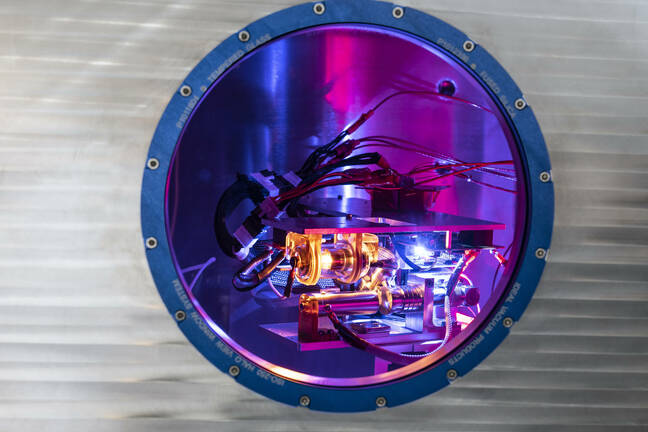This article is more than 1 year old
Space mining startup prepping to launch 'demo' refinery... this April
Last (failed) attempts at such an endeavor happened a decade ago, but AstroForge thinks it can do better
Cast your mind back to the year 2012 and you might stumble upon a very similar story, but this isn't a flashback: There's a new startup in town that wants to mine asteroids, and this one claims to be ahead of the game.
AstroForge, which came onto the scene last May with the announcement of a successful $13 million seed round, says it has two launches planned for this year to deploy a demonstration orbital refinery and scout an asteroid for mineable resources.
"With launches secured and partners on board, we're charging on an accelerated path to make asteroid mining a near-term solution to preserving Earth's declining resources," the company said.
Speaking to Bloomberg, AstroForge CEO Matthew Gialich, a veteran of Virgin Galactic and Bird, said the company ultimately plans to mine and refine rare Earth minerals directly on asteroids. For now, however, there's the matter of proving the technology works.
During its April mission, AstroForge claimed its "orbital refinery" will be loaded with asteroid-like material, similar to tests the company has done in a vacuum chamber on Earth. Said material is superheated and vaporized into a gas, Gialich told us, and then bombarded with plasma in order to ionize it.
A mass spectrometer is used to determine what sorts of materials have been sampled. Then it's just a matter of extracting what's wanted, dumping the rest and turning it back into a solid form. Easy peasy, the biz claims, although boffins might beg to differ.
Gialich told The Reg the metals refined from the test machine are very pure, but he said as the technology is scaled, purity will decrease. Gialich said the decreased purity wouldn't leave the metals inferior or less usable, though.
As for why AstroForge needs to send a second mission to scout an asteroid that NASA likely already has data on, Gialich says it's a matter of practicality.
"We're not 100 percent sure about the type or surface of the target asteroid. We're 90 percent sure we know what it is and what its surface looks like, but this could be just like Bennu and its surface could be a surprise," Gialich said.
Bennu was the landing site of NASA's OSIRIS-REx spacecraft in 2018, and when NASA arrived astronomers were surprised to find a surface full of rubble, unlike the smooth, sandy surface Earth-based observations suggested.
Gialich also said the scout will serve as a model verification mission. "If this succeeds we'll be the first commercial company to launch a deep space mission," he said, adding that Elon Musk's launch of a Tesla into space doesn't count.
An industry with a miner problem
AstroForge, founded and led by Gialich and SpaceX veteran Jose Acain, has a tough road ahead of it, and not only because the technology needed to mine asteroids doesn't exist outside of its lab.
- TSMC: You know what would be fab? Some local neon supplies
- China reminds world shock and ore can hurt tech supply chains
- NASA launches guide to Lunar etiquette now that private operators will share the Moon with governments
- India makes a play to source rare earths – systematic scrapping of its old cars
- Who owns space? Looking at the US asteroid-mining act
It also has to face the fact that some big names, like filmmaker James Cameron and his business partners Larry Page and Eric Schmidt of Google, have tried and failed to exploit the riches of near-Earth space.
Cameron, Schmidt and Page's company, founded in 2012, was known as Planetary Resources; it slowly declined until purchased by a blockchain company.
Another space mining outfit known as Deep Space Industries was formed in January 2013 but later switched to satellite development before being purchased by Bradford Space in 2019.
Gialich admitted to Bloomberg that the road will be tough, but said he learnt from DSI and Planetary Resources' failures – a decade of additional technological development hasn't hurt, either.
"We've made a lot of progress in the last 10 to 15 years since those two companies really existed … primarily around launch. I can now buy a rideshare mission to the moon," Gialich said.
One of the ways AstroForge claims to have differentiated itself is by outsourcing most of its infrastructure to private space companies like OrbAstro, which is building AstroForge's scout craft for the October launch, and SpaceX, which its partnering with on both planned launches, Gialich told Bloomberg.
That, Gialich claims, frees up time for AstroForge to focus on its zero-g refining tech and planning missions, two more of which are tentatively scheduled for the next couple of years.
Gialich described the choice of outsourcing to other space companies as a logical one – other companies already know how to build rockets and satellites. "OrbAstro has been a great partner, but they're just building the craft," Gialich said. The payload in the craft, its trajectory and operation fall to AstroForge.
If the first two launches go to plan, a third mission will be sent to the previously-scouted asteroid to attempt a touchdown. A fourth would then return to extract and refine metals to take back to earth Earth.
NASA's OSIRIS-REx is currently headed back to Earth with a sample bay full to the brim (minus the bits leaking out) with asteroid dirt. The craft is finally due back on Earth in September of this year after launching in 2016.
In other words, if asteroid mining succeeds this time, it's going to take a while. ®

